Cards In This Set
| Front | Back |
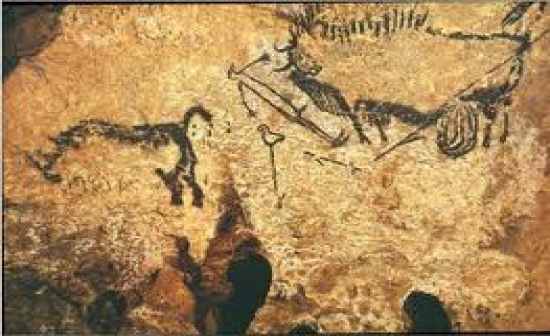 Rhinoceros, Wounded Man, and Bison, Dordogne, France. ca. 15,000-13,000 BCE 1.4 |
-separate images or earliest known narrative
-gory tale of a hunt, or a shaman's encounter with his spirit creatures -male stick figure w birdlike head likes b/w wooly rhinoceros & disemboweled bison, bird-headed stick/staff nearby -composite image |
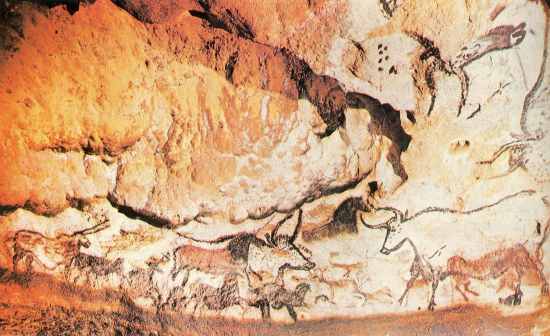 Hall of the Bulls, Lascaux Cave, Dordogne, France. ca 15,000 - 13,000 BCE 1.8 |
Largest bull approximate length 11'6"; located @ bottom of 16ft well shaft; viewers contend with precarious path, eerie flickering lights, echoing sounds, & muty smells --> all add texture to viewing process
luminated - rock lamps w fat/marrow -used scaffolds, prepared wall by scraping w stoane tools-brings out white chalkiness for background -deep in cave-ritual/religious purpose? -magico-religious-naturalistic animals within outlines-control them, unnaturalistic human to avoid same control |
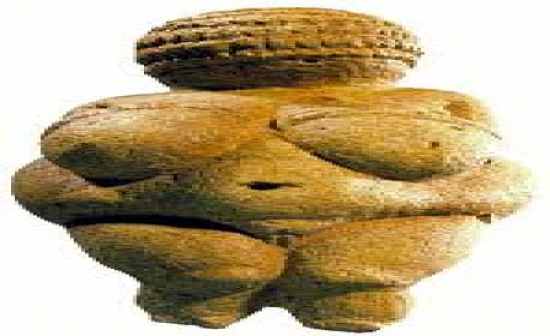 Woman of Eillendorf. ca. 28,000 - 25,000 BCE. Limestone 1.14; discovered in 1908; hieght 4 3/8"; nude woman, hand-sized |
-suggest obstetrics tool/aid, documenting different stages of preg. to educate women towards healthy birth; may indicate artist was a woman
-abstract quality-streses potent fertility, no facial features-covered w schematically rendered hair (covers entire head) -emphasis on figure's reproductive qualities-diminitive arms on large breasts, extended belly, large buttocks, genetalia b/w larg thighs -fertility object? distorted view of body may suggest woman artist |
 Human FIgures, from Ain Ghazal, Jordan. ca. 6750-6250 BCE. 1.18; over 30 fragmented figures from bust sized to tallest of ~3ft |
-first known large-scale sculptures
-large size-motivating factor-led to flat, shallow appearance -plaster applied to bundles of fresh reeds, w cordage, kept horizontal during assembly, legs added later -paint applied, cowrie shells for eyes, darkened w bitumen (black tar-like substance) for pupils -once plaster dry-stood fragile figures upright & probably added wigs & clothing -like Jericho, heads may have represented ancestors, some had 2 heads - mythical function? |
 Reconstruction of Catal HNeolithic town, Huyuk, Turkey. 1.19; ~7500 BCE (~1000yrs later than Jericho) |
-Traded in ore - mainly obsidian
-lacked streets -mud-brick & timber houses -no doors @ ground level - accessed by hole in roof -each house shared wall(s) with neighbours -advantages: -structural, saved on building materials & heating -defensive-attacker had to scale walls & met with resistance on roof -rooms accomodated workiing, cooking, sleeping (on wall platforms) -burials beneath floor -plastered walls often painted |
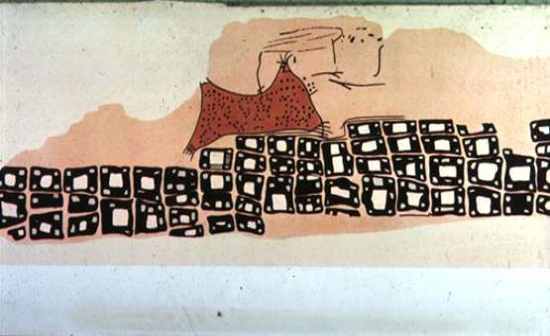 View of Town and Volcano, Shrine VII.14, Catal Huyuk. ca. 6000BCE 1.21 |
-possibly first lanscape painting
-of Catal Huyuk w volcano -rows of irregular blocklike houses (town?) & above it a bright red feature spotted w black & topped iwth black lines & dots may represent Hasan Dag, a twin-peaked volcano in view of town -may indicate a sense of community in this early ssettlement, w inhabitants specifially identifying themselves w place |
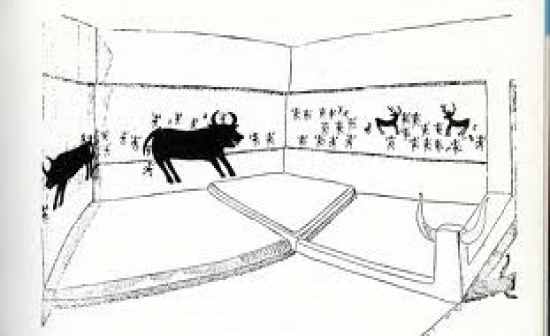 Animal Hunt. Restoration of Main Room, Shrine A.III.1, Catal Huyuk, ca, 6000BCE 1.21 |
-plaster covered walls often painted
-depicting animal hunts w small human figures running around disproportionately large bulls/stags -paintings were static, unlike earlier cave paintings that embodied motion -most ornate rooms - shrines? bulls' horns & plaster breasts may have signified fertility |
 Stonehenge. Salisbury Plain, WIltshire, England. ca. 2100 BCE. 1.25 |
-megaliths in a chromlech (circle)
-like Menec, may mark the passing of time -may have had a ritual function, perhaps assoc w burial-arrangement supports this-circles central to rituals in many societies -many medieval observers to believed K. Arthur's magician created it -like Menec-took tremendous organization of labour & engineering skill -largest trilith @ centre of horseshoe, 24ft, supports a lintel 15ft long and 3ft thick -the sarsen (sandstone) blocks weigh up to 50tons & travelled 37km fr Marlbourough Downs -the bluestones originated 320km away in Welsh Preseli Mountains --> meticulous stone working - |



